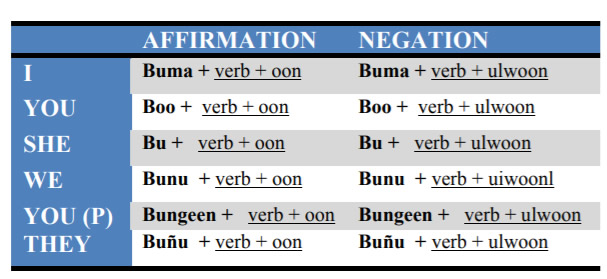Difference between revisions of "Language/Wolof/Grammar/Conditional"
Jump to navigation
Jump to search
(Created page with "This conjugation is used to render the conditional in Wolof, by conditional we mean the English “if + subject + verb in the past” (if I had- if you were not a volunteer)....") |
|||
| Line 1: | Line 1: | ||
This conjugation is used to render the conditional in Wolof, by conditional we mean the English “if + subject + verb in the past” (if I had- if you were not a volunteer). In Wolof, the structure and the second part of the sentence that we could call the subordinate part, will not change, but the ending of the verb of the main clause will change as state with the below table: | This conjugation is used to render the conditional in Wolof, by conditional we mean the English “if + subject + verb in the past” (if I had- if you were not a volunteer). In Wolof, the structure and the second part of the sentence that we could call the subordinate part, will not change, but the ending of the verb of the main clause will change as state with the below table: | ||
[[File:wolof-Conditional-PolyglotClub.jpg]] | [[File:wolof-Conditional-PolyglotClub.jpg]] | ||
==Source== | |||
http://publish.illinois.edu/wolof201fall14/files/2014/08/NEW_WOLOF_BOOK.pdf | |||
Revision as of 15:56, 15 September 2021
This conjugation is used to render the conditional in Wolof, by conditional we mean the English “if + subject + verb in the past” (if I had- if you were not a volunteer). In Wolof, the structure and the second part of the sentence that we could call the subordinate part, will not change, but the ending of the verb of the main clause will change as state with the below table:
Source
http://publish.illinois.edu/wolof201fall14/files/2014/08/NEW_WOLOF_BOOK.pdf
